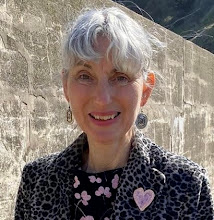Guan Yin and the Asian tradition
It is generally
accepted among East Asian adherents that Guanyin originated as the Sanskrit Avalokiteśvara (अवलोकितेश्वर).
Commonly known in
English as the Mercy Goddess or Goddess of Mercy, Guanyin
is also revered by Chinese Taoists (or Daoists) as an Immortal.
Some Buddhist and Christian observers have
commented on the similarity between Guanyin and Mary of Christianity, the mother of Jesus Christ. This can be attributed to the representation of
Guanyin holding a child in Chinese art and sculpture; it is believed that
Guanyin is the patron saint of mothers and grants parents filial children. When
the Tzu-Chi Foundation, a Taiwanese Buddhist
organisation, noticed the similarity between this form of Guanyin and the
Virgin Mary, the organisation commissioned a portrait of Guanyin and a baby
that resembles the typical Roman Catholic Madonna and Child painting.
During the Edo Period in Japan, when Christianity was banned and
punishable by death, some underground Christian groups venerated the Virgin
Mary disguised as a statue of Kannon; such statues are known as Maria Kannon. Many had a
cross hidden in an inconspicuous location.
Finally Kuan Yin’s father ordered that she be
killed and after several failed attempts she was murdered and went to the
kingdom of the Dead. There she was so
kind and compassionate to the other souls that the King of the Dead had her
thrown out and she was sent back to this world and reunited with her body. She is the goddess of pure compassion who
will always listen and share the sorrows of her supplicants.
On a more secular note:
Poem No.
43 from the Kuan Yin Oracle
Meaning: The Heaven and earth are full of great joys and harmony.
Comments:
You are in the days of glorious peace and joy. You are in
the place to enjoy the lighter and brighter side of life. Bring harmony
and beauty into your home. Spread the kindness, generosity to those
around you.
You get the kind of cooperation you were hoping for, and what
once was a problem becomes a possibility. Delightfully engaging
activities make you feel loved and happy.
Tao Te Ching
No 49
The Master has no mind of her own.
She works with the mind of the people.
She is good to people who are good.
She is also good to people who aren't good.
This is true goodness.
She trusts people who are trustworthy.
She also trusts people who aren't trustworthy.
This is true trust.
The Master's mind is like space.
People don't understand her.
They look to her and wait.
She treats them like her own children.







No comments:
Post a Comment